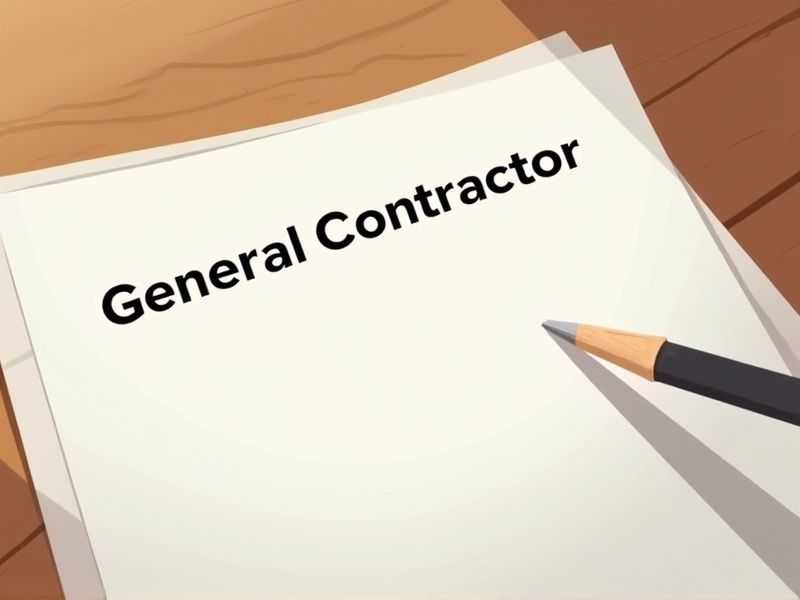
General contractors require specific certifications to ensure adherence to industry standards and legal regulations, enhancing project credibility and safety. Certifications validate a contractor's expertise and capability to efficiently manage complex construction projects, reducing risks and inefficiencies. They also foster trust among clients and stakeholders, bolstering business opportunities and reputation. Key certifications essential for a general contractor include those related to safety management, project management, and specialized construction techniques.
State General Contractor License
A State General Contractor License is needed to ensure that the contractor meets established safety and building standards set by regulatory authorities. It helps protect consumers by verifying that contractors have the necessary skills and expertise to safely perform construction tasks. Licensing reduces the risk of fraud and substandard work by holding contractors accountable for their professional conduct. The license also facilitates formal dispute resolution processes and provides a mechanism for addressing grievances.
OSHA 30-Hour Construction Safety Certification
OSHA 30-Hour Construction Safety Certification equips general contractors with essential knowledge on workplace safety standards, reducing the risk of jobsite injuries. Familiarity with OSHA regulations helps prevent costly legal consequences and penalties related to safety violations. Contractors with this certification often have a competitive edge, as many clients and projects require compliance with safety education standards. This certification fosters a culture of safety and responsibility, enhancing overall productivity and worker morale.
OSHA 10-Hour Construction Safety Certification
The OSHA 10-Hour Construction Safety Certification equips general contractors with essential knowledge to identify and mitigate workplace hazards. This certification helps reduce workplace injuries and fatalities, leading to a safer construction environment. Contractors with this certification often see increased job site efficiency and compliance with federal regulations. Holding this credential can improve a contractor's reputation and competitiveness in bidding for projects.
EPA Lead-Safe Renovation Certification
EPA Lead-Safe Renovation Certification is required for general contractors to ensure compliance with safety regulations aimed at preventing lead exposure, particularly in older buildings where lead-based paint is prevalent. Exposure to lead dust or chips can cause serious health issues, especially in children, such as developmental delays and behavioral problems. This certification equips contractors with the necessary training to handle and mitigate lead hazards during renovation work, minimizing health risks. General contractors also gain a competitive edge by demonstrating a commitment to safety and regulatory adherence, which can be a deciding factor for potential clients.
First Aid/CPR Certification
General contractors often work on construction sites where accidents and injuries can occur, and First Aid/CPR certification equips them to respond quickly to emergencies, potentially saving lives. The presence of a certified individual can reduce the severity of injuries, minimizing downtime and project delays. OSHA recognizes the importance of safety certifications, influencing compliance and possibly leading to fewer inspections and fines. Clients may prefer contractors with such certifications, which can enhance the contractor's reputation and increase business opportunities.
LEED Accredited Professional (AP)
A LEED Accredited Professional provides expertise in sustainable building practices, which helps a general contractor effectively implement environmentally friendly construction methods. With the growing demand for green buildings, having a LEED AP enhances the contractor's ability to meet client expectations and regulatory standards for sustainability. This accreditation also aids in streamlining the documentation process required for LEED certification projects, potentially improving project timelines and cost efficiency. The presence of a LEED AP can improve a contractor's market competitiveness by demonstrating a commitment to sustainability and expertise in cutting-edge building practices.
Project Management Professional (PMP)
The PMP certification provides a structured approach to project management, ensuring general contractors can handle complex projects efficiently. With a PMP, general contractors demonstrate competence in resource allocation, risk management, and project scheduling, vital for meeting industry standards. Clients and stakeholders often trust PMP-certified professionals more, enhancing reputation and increasing business opportunities. The rigorous training involved in PMP certification equips general contractors with leadership and communication skills essential for successful project execution.
Certified Construction Manager (CCM)
A Certified Construction Manager (CCM) is needed for a general contractor to ensure project efficiency by applying standardized construction management practices, which minimizes delays and cost overruns. Employing a CCM increases a project's quality and safety standards as their certification reflects expertise in managing the construction process comprehensively. The presence of a CCM enhances client confidence by providing assurance of professional oversight and compliance with industry standards. A CCM serves as a critical link in coordinating communication between subcontractors, architects, and clients, fostering a cohesive and well-managed project lifecycle.
Certified Professional Constructor (CPC)
The Certified Professional Constructor (CPC) credential enhances a general contractor's credibility by proving their adherence to professional standards. This certification demonstrates the contractor's commitment to continuous education and mastery of best practices in construction management. It also attracts clients, as they often prefer working with certified professionals who can ensure quality and safety. Having the CPC can lead to better project outcomes and increased efficiency due to the specialized knowledge acquired.
NCCER Construction Certification
General contractors holding NCCER Construction Certification often demonstrate a recognized standard of skill and knowledge in the construction industry, leading to increased trust from clients and stakeholders. This certification ensures that the contractor has completed standardized training and assessments, which can result in improved project quality and safety compliance. Many construction projects, especially large-scale or government-related ones, may require or prefer certified professionals, thus expanding job opportunities. Holding this certification may also translate into competitive advantages in bidding processes, as it signals a commitment to professionalism and industry excellence.
Summary
When you obtain certifications as a General Contractor, your credibility in the industry significantly increases. This credibility can lead to more project opportunities due to enhanced trust from clients and stakeholders. The certifications also often result in improved skills and knowledge, which can lead to more efficient project management and execution. Consequently, you may experience higher earning potential and career advancement prospects due to these competitive advantages.
